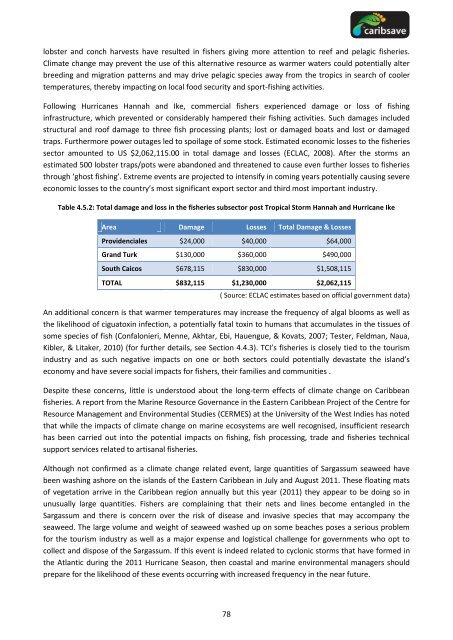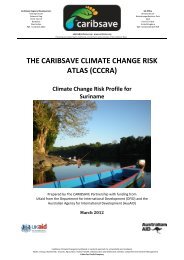Create successful ePaper yourself
Turn your PDF publications into a flip-book with our unique Google optimized e-Paper software.
lobster <strong>and</strong> conch harvests have resulted in fishers giving more attention to reef <strong>and</strong> pelagic fisheries.<br />
Climate change may prevent the use of this alternative resource as warmer waters could potentially alter<br />
breeding <strong>and</strong> migration patterns <strong>and</strong> may drive pelagic species away from the tropics in search of cooler<br />
temperatures, thereby impacting on local food security <strong>and</strong> sport-fishing activities.<br />
Following Hurricanes Hannah <strong>and</strong> Ike, commercial fishers experienced damage or loss of fishing<br />
infrastructure, which prevented or considerably hampered their fishing activities. Such damages included<br />
structural <strong>and</strong> roof damage to three fish processing plants; lost or damaged boats <strong>and</strong> lost or damaged<br />
traps. Furthermore power outages led to spoilage of some stock. Estimated economic losses to the fisheries<br />
sector amounted to US $2,062,115.00 in total damage <strong>and</strong> losses (ECLAC, 2008). After the storms an<br />
estimated 500 lobster traps/pots were ab<strong>and</strong>oned <strong>and</strong> threatened to cause even further losses to fisheries<br />
through ‘ghost fishing’. Extreme events are projected to intensify in coming years potentially causing severe<br />
economic losses to the country’s most significant export sector <strong>and</strong> third most important industry.<br />
Table 4.5.2: Total damage <strong>and</strong> loss in the fisheries subsector post Tropical Storm Hannah <strong>and</strong> Hurricane Ike<br />
Area Damage Losses Total Damage & Losses<br />
Providenciales $24,000 $40,000 $64,000<br />
Gr<strong>and</strong> Turk $130,000 $360,000 $490,000<br />
South <strong>Caicos</strong> $678,115 $830,000 $1,508,115<br />
TOTAL $832,115 $1,230,000 $2,062,115<br />
( Source: ECLAC estimates based on official government data)<br />
An additional concern is that warmer temperatures may increase the frequency of algal blooms as well as<br />
the likelihood of ciguatoxin infection, a potentially fatal toxin to humans that accumulates in the tissues of<br />
some species of fish (Confalonieri, Menne, Akhtar, Ebi, Hauengue, & Kovats, 2007; Tester, Feldman, Naua,<br />
Kibler, & Litaker, 2010) (for further details, see Section 4.4.3). TCI’s fisheries is closely tied to the tourism<br />
industry <strong>and</strong> as such negative impacts on one or both sectors could potentially devastate the isl<strong>and</strong>’s<br />
economy <strong>and</strong> have severe social impacts for fishers, their families <strong>and</strong> communities .<br />
Despite these concerns, little is understood about the long-term effects of climate change on Caribbean<br />
fisheries. A report from the Marine Resource Governance in the Eastern Caribbean Project of the Centre for<br />
Resource Management <strong>and</strong> Environmental Studies (CERMES) at the University of the West Indies has noted<br />
that while the impacts of climate change on marine ecosystems are well recognised, insufficient research<br />
has been carried out into the potential impacts on fishing, fish processing, trade <strong>and</strong> fisheries technical<br />
support services related to artisanal fisheries.<br />
Although not confirmed as a climate change related event, large quantities of Sargassum seaweed have<br />
been washing ashore on the isl<strong>and</strong>s of the Eastern Caribbean in July <strong>and</strong> August 2011. These floating mats<br />
of vegetation arrive in the Caribbean region annually but this year (2011) they appear to be doing so in<br />
unusually large quantities. Fishers are complaining that their nets <strong>and</strong> lines become entangled in the<br />
Sargassum <strong>and</strong> there is concern over the risk of disease <strong>and</strong> invasive species that may accompany the<br />
seaweed. The large volume <strong>and</strong> weight of seaweed washed up on some beaches poses a serious problem<br />
for the tourism industry as well as a major expense <strong>and</strong> logistical challenge for governments who opt to<br />
collect <strong>and</strong> dispose of the Sargassum. If this event is indeed related to cyclonic storms that have formed in<br />
the Atlantic during the 2011 Hurricane Season, then coastal <strong>and</strong> marine environmental managers should<br />
prepare for the likelihood of these events occurring with increased frequency in the near future.<br />
78





